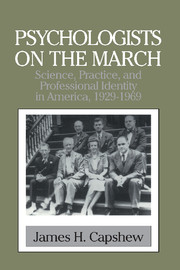Book contents
- Frontmatter
- Contents
- Acknowledgments
- List of Abbreviations
- Introduction: The Psychologists' War
- Interlude I
- 1 Growing Pains: After the Great War
- 2 Mobilizing for World War II: From National Defense to Professional Unity
- 3 Home Fires: Female Psychologists and the Politics of Gender
- Interlude II
- 4 Sorting Soldiers: Psychology as Personnel Management
- 5 Applied Human Relations: The Utility of Social Psychology
- 6 From the Margins: Making the Clinical Connection
- 7 Engineering Behavior: Applied Experimental Psychology
- Interlude III
- 8 A New Order: Postwar Support for Psychology
- 9 Remodeling the Academic Home
- Interlude IV
- 10 The Mirror of Practice: Toward a Reflexive Science
- 11 Beyond the Laboratory: Giving Psychology Away
- Interlude V
- Epilogue: Science in Search of Self
- Index
Interlude III
Published online by Cambridge University Press: 06 July 2010
- Frontmatter
- Contents
- Acknowledgments
- List of Abbreviations
- Introduction: The Psychologists' War
- Interlude I
- 1 Growing Pains: After the Great War
- 2 Mobilizing for World War II: From National Defense to Professional Unity
- 3 Home Fires: Female Psychologists and the Politics of Gender
- Interlude II
- 4 Sorting Soldiers: Psychology as Personnel Management
- 5 Applied Human Relations: The Utility of Social Psychology
- 6 From the Margins: Making the Clinical Connection
- 7 Engineering Behavior: Applied Experimental Psychology
- Interlude III
- 8 A New Order: Postwar Support for Psychology
- 9 Remodeling the Academic Home
- Interlude IV
- 10 The Mirror of Practice: Toward a Reflexive Science
- 11 Beyond the Laboratory: Giving Psychology Away
- Interlude V
- Epilogue: Science in Search of Self
- Index
Summary
By 1944, only a decade after he led psychology at Harvard to independent departmental status, Edwin Boring faced a serious challenge to the status quo he had helped to create. Differences between what Boring called the “sociotropes” and the “biotropes” in the department were threatening to split the faculty into warring camps. The biotropes included Boring and his allies, who emphasized the more traditional and experimental parts of psychology, such as sensation, perception, psychophysics, and psychophysiology. In contrast, the sociotropes were more oriented toward the social sciences in their studies of social, clinical, and personality psychology. At Harvard they included Gordon Allport, Henry Murray, and their associates.
The wartime salience of sociotropic psychology emboldened Murray and Allport to join forces with their colleagues in anthropology and sociology to propose a new department that would focus on social behavior. They argued that existing institutional arrangements favored traditional experimental psychology and would not allow them to pursue their ambitious goal of a unified science of human personality, society, and culture. Although Boring had some sympathy for the sociotropic point of view, he was unwilling to make fundamental changes in the psychology department's program. That reluctance, coupled with efforts of sociologist Talcott Parsons and other powerful Harvard faculty members, led to the creation of the separate Department of Social Relations in 1945. Chaired by Parsons and with Samuel Stouffer directing the laboratory, it brought together sociologists, anthropologists, and psychologists interested in personality and social behavior.
- Type
- Chapter
- Information
- Psychologists on the MarchScience, Practice, and Professional Identity in America, 1929–1969, pp. 155 - 158Publisher: Cambridge University PressPrint publication year: 1999

